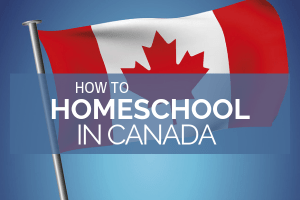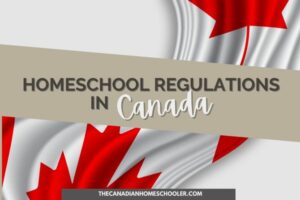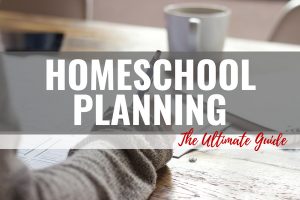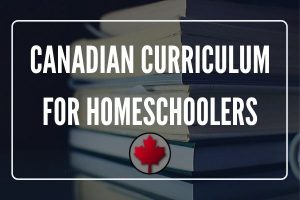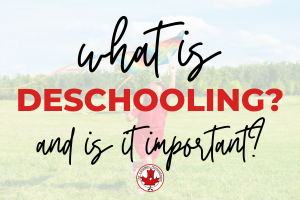SO YOU'VE DECIDED TO HOMESCHOOL. HERE'S WHAT TO DO NOW.
THE FIRST THING YOU NEED IS A MAP.
My book, How to Homeschool in Canada, is your guide to getting started with homeschooling with confidence and clarity.
Receive the introduction chapter which takes you along the path of the homeschooling journey from preschool to high school. when you sign up for my email list.
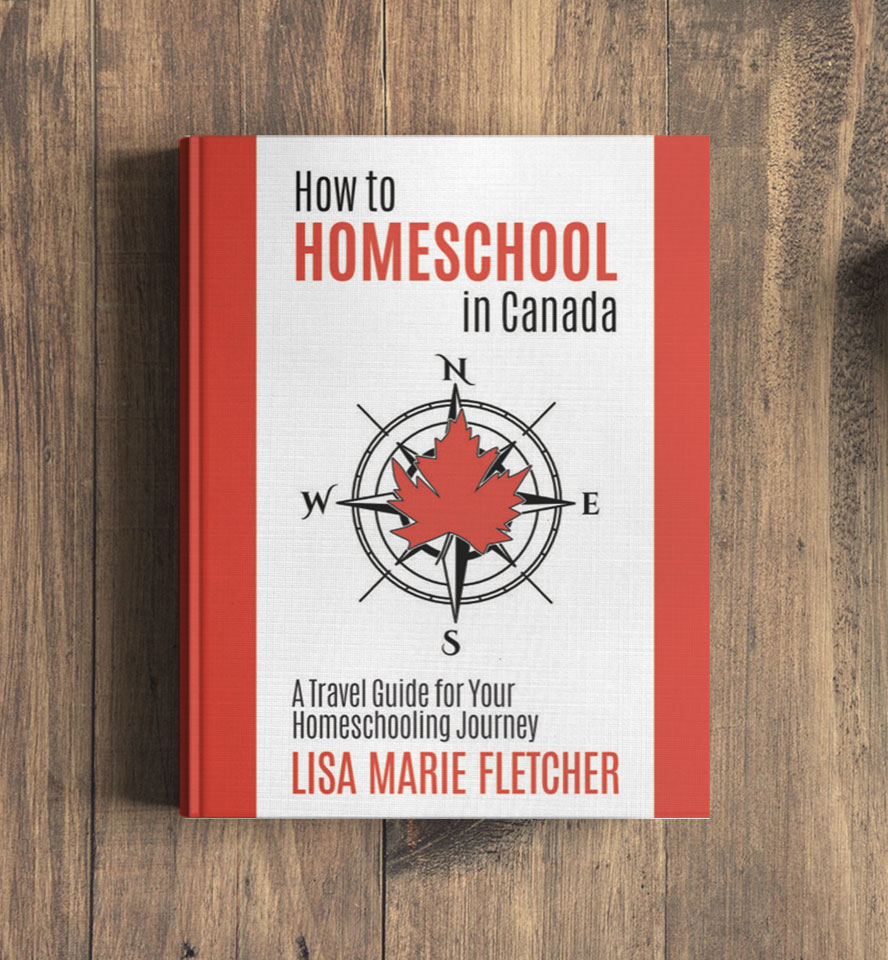
READY TO BEGIN? HERE'S HOW.
STEP ONE: KNOW THE RULES.
Each province and territory in Canada has a unique set of rules and regulations about homeschooling.
You need to find out and follow the ones for your province.
STEP TWO: FIND A SUPPORT GROUP.
Connect with an in-person community for you and your children. Find an online network. Support is vital.
STEP THREE: PICK A HOMESCHOOL METHOD.
Homeschool doesn't have to be like school. There are so many approaches to teaching and learning. Find one that fits your child, your family, and your lifestyle.
STEP FOUR: CHOOSE CURRICULUM.
There are millions of options for curriculum. Narrow down your choices by answering some key questions and doing intentionally specific research.
STEP FIVE: PLAN OUT YOUR YEAR.
Pull it all into a plan for the year, figure out your daily and weekly learning schedule, and get everything prepped and ready to go!
STEP SIX: GET ORGANIZED.
You don't need to set up a homeschool room, but you will need a place to keep all your books, your teacher guides, and any school supplies you accumulate.
PROVINCE BY PROVINCE
Homeschooling is legal in all provinces and territories in Canada, however there are different rules depending on where you live.
**LEGAL REQUIREMENTS**
In British Columbia, there are actually 2 main options for learning at home.
The first is called Online Learning. This actually isn't categorized as homeschooling. Instead this approach is actually intended to be the same as public school but done at home under the supervision of a teacher. Students are enrolled in the program - whether it be through a public or independent school.
The second is Homeschooling. This method allows families to choose how and what they are teaching their children at home, without needing to meet the provincial learning outcomes or guidance from a teacher. Students are registered, and you must send in your registration by September 30th each year.
Students who are registered as homeschoolers do not qualify for a Dogwood, however enrolled students can receive a high school diploma when they complete specific credit requirements.
**CURRICULUM CONSIDERATIONS**
If you register as a homeschooler, you can use any curriculum you choose. There is no requirement to follow the BC curriculum or be supervised. No government funding is provided, and parents are fully responsible for planning and delivering instruction.
If you enroll in a Distributed Learning program, you may receive partial funding, must follow the BC curriculum, and work with a certified teacher using their educational plans. This option requires reporting.
**KEY RESOURCES**
- BC Home Educators' Association
- British Columbia Classroom Alternatives - comparing homeschooling and online learning
- Online Learning BC Hub
**LEGAL REQUIREMENTS**
In Alberta, homeschooling is recognized and regulated by Alberta Education. Families must notify a supervising school authority each year and file an education plan.
There are three main options for learning at home in Alberta:
Supervised, Funded Homeschooling
This option requires you to register with a willing school board or private school that agrees to supervise your homeschool program. You submit an education plan, follow Alberta’s Home Education Regulation, and meet twice per year with a facilitator. Families receive partial funding to offset educational expenses.
Unsupervised Homeschooling
This is called "Notification Only". You notify the Minister of Education directly and proceed without funding or supervision. You remain fully responsible for your program and record-keeping.
**CURRICULUM CONSIDERATIONS**
If you choose supervised homeschooling, you must provide a home education plan and demonstrate student progress. While you have flexibility in your approach, your plan must align with either the Alberta Program of Study or Alberta’s prescribed learning outcomes for home education.
If you choose unsupervised notification-only homeschooling, you have complete freedom to design your curriculum and learning activities. There is no funding and no facilitator oversight.
KEY RESOURCES
- AHEA – Alberta Home Education Association
- Alberta Homeschool Association
- Home Education - Alberta.ca Website
- Associate Boards and Independent Schools in Alberta list
**LEGAL REQUIREMENTS**
In Saskatchewan, homeschooling is legal and regulated under The Education Act. Families must register annually with their local school division and submit an education plan outlining their goals and methods.
Notification and Registration
You must notify your school division of your intent to homeschool each school year. This includes submitting:
-
A written education plan
-
A completed registration form
Once approved, you are considered a registered homeschooler under provincial law.
Students who are homeschooled do not receive a standard provincial high school diploma automatically. However, they may access distance learning courses or challenge credits to complete graduation requirements if desired.
**CURRICULUM CONSIDERATIONS**
Parents have significant flexibility to design their curriculum. Your education plan should describe:
-
The learning objectives for each subject area
-
The materials and methods you’ll use
-
How you will assess progress
Families are expected to submit an annual summative report to the school division. Some divisions may also require samples of student work.
Registered homeschoolers may be eligible to receive partial funding or reimbursement for educational resources, depending on the policies of their local school division.
**KEY RESOURCES**
**LEGAL REQUIREMENTS**
In Manitoba, homeschooling is legal and governed by The Public Schools Act. Parents must notify the Department of Education each year of their intent to homeschool.
You are required to:
-
Submit a notification form for each child by September 1 every year.
-
Provide a summary of your proposed education plan.
Students who are homeschooled do not automatically receive a standard high school diploma, but can access distance learning or challenge credits if they wish to complete graduation requirements.
**CURRICULUM CONSIDERATIONS**
Families are free to choose their own curriculum. There is no requirement to follow the Manitoba curriculum, and no obligation to use certified teachers.
However, parents must submit two progress reports per year—one by January 31 and one by June 30—outlining what the child has been learning and their progress in core subject areas (language arts, mathematics, science, social studies).
Manitoba does not provide funding or reimbursement for homeschooling expenses.
**KEY RESOURCES**
**LEGAL REQUIREMENTS**
In Ontario, homeschooling is legal and recognized under the Education Act. Parents have the right to provide satisfactory instruction at home without needing approval from the school board.
While not mandatory by law, the Ministry of Education strongly encourages families to submit a Letter of Intent to their local school board each year. This letter informs the board that you are withdrawing your child from school to homeschool.
If your child has never been enrolled in school, you can still submit the Letter of Intent for clarity, but it is not required.
The school board may contact you if there are concerns about whether your child is receiving satisfactory instruction. If so, you may be asked to provide evidence of your educational activities.
Homeschooled students do not automatically receive the Ontario Secondary School Diploma (OSSD). However, teens can pursue high school credits through online schools, correspondence programs, or by applying to take courses as independent students.
**CURRICULUM CONSIDERATIONS**
Ontario does not prescribe a specific curriculum for homeschoolers. Parents are fully responsible for designing and delivering their child’s education.
You can:
-
Use any curriculum or learning method you prefer.
-
Incorporate Ontario curriculum expectations if you wish (available free online).
-
Choose your own schedule and style.
There is no funding or reimbursement provided for homeschooling in Ontario.
**KEY RESOURCES**
**LEGAL REQUIREMENTS**
In Quebec, homeschooling is legal and governed by the Education Act and Regulation Respecting Homeschooling. Families must follow mandatory notification, reporting, and oversight requirements.
Notification and Registration
Each year, you must:
-
Submit a written notice of intent to your local school service centre (school board) by July 1 or within 10 days of removing your child from school.
-
Also notify the Ministère de l’Éducation by the same date.
Learning Project
You are required to submit a Learning Project by September 30 outlining:
-
The educational approach you will use.
-
The competencies and subjects your child will be studying (must include French, English, math, science, and social studies).
Monitoring
During the year, you must:
-
Participate in at least one annual monitoring meeting with your school board.
-
Submit two progress reports, typically mid-year and at the end of the year.
-
Provide a completion report and samples of work at the end of the school year.
Students who complete recognized distance learning programs or take exams through the Ministry can earn credits toward a diploma.
For accurate, up-to-date information - please visit AQED .
**CURRICULUM CONSIDERATIONS**
Quebec requires that your Learning Project demonstrate your child will develop competencies comparable to those in the Québec Education Program.
* You may choose your own curriculum and methods as long as you cover the compulsory subjects and competencies.
* You are not obligated to use Ministry-approved materials but must show your program is equivalent in scope.
* Instruction must be primarily in French, unless you qualify for exemptions.
No funding or reimbursement is provided for homeschooling expenses in Quebec.
**KEY RESOURCES**
- Quebec Education: Homeschooling
- Association l’éducation à domicile (AQED)
- Association of Christian Parent Educators of Québec (ACPEQ) (bilingual site)
**LEGAL REQUIREMENTS**
In New Brunswick, homeschooling is legal under the Education Act. Parents must notify their local school district each year that they intend to homeschool.
Each school year, you must:
-
Complete and submit a Notice of Home Schooling to your local superintendent’s office.
-
Submit this form annually, even if you have been homeschooling in previous years.
Once your notification is filed, you are legally permitted to begin homeschooling.
Students who are homeschooled do not automatically receive a New Brunswick high school diploma. However, families can enroll their teens in correspondence courses or distance education to earn credits toward graduation if desired.
**CURRICULUM CONSIDERATIONS**
New Brunswick does not prescribe a required curriculum for homeschoolers.
* You are free to choose the resources and methods that best suit your family’s needs.
* There is no requirement to follow the provincial curriculum or to use certified teachers, however the recommendation for "effective instruction" is to include language arts, math, science & tech, social studies, health, careers, French, music, art, and phys. ed.
* You are encouraged to maintain records of your child’s progress and learning activities for your own documentation.
New Brunswick does not provide funding or reimbursement for homeschooling expenses.
**KEY RESOURCES**
**LEGAL REQUIREMENTS**
In Nova Scotia, homeschooling is legal and regulated under the Education Act. Parents are required to register each year with the Nova Scotia Department of Education and Early Childhood Development.
Each year, you must:
-
Submit a Registration Form for Home Schooling to the Department by September 20 (or within 30 days of starting homeschooling if you begin mid-year).
At the end of the school year, you must file a Progress Report summarizing what your child has studied and describing their progress.
Homeschooled students in Nova Scotia do not automatically receive a provincial high school diploma, but they can pursue credits through correspondence or distance learning programs if desired.
**CURRICULUM CONSIDERATIONS**
Nova Scotia does not require families to follow the provincial curriculum, and you are free to design a program that meets your child’s needs.
* You can choose any curriculum, materials, or methods you prefer.
* You are expected to maintain records of your child’s learning and progress to help complete your annual report.
No funding or reimbursement is provided by the province for homeschooling expenses. Diplomas are not available for homeschooled students.
KEY RESOURCES
**LEGAL REQUIREMENTS**
In Prince Edward Island, homeschooling is legal under the Education Act. Parents must register each year with the Department of Education and Lifelong Learning.
-
Submit a Home Education Notification Form to the Department before starting homeschooling.
-
Notify annually for each child you are homeschooling.
You will receive confirmation from the Department once your registration is processed.
Homeschooled students in PEI do not automatically receive a provincial high school diploma.
**CURRICULUM CONSIDERATIONS**
PEI law requires you to ensure your child receives an education comparable to what is offered in the public school system.
You are able to request curriculum books / resources to use with your children for the year. A form is available on the government website.
No government funding or reimbursement is provided for homeschooling expenses in PEI.
KEY RESOURCES
**LEGAL REQUIREMENTS**
In Newfoundland and Labrador, homeschooling is legal under the Schools Act. Parents must apply each year to the Director of Education for permission to homeschool.
To homeschool, you must:
-
Submit a Home Schooling Application Form to the Newfoundland and Labrador English School District (NLESD) or the relevant school district if you are in a different system.
-
Provide details about your proposed educational program, including curriculum, resources, and instructional plans.
Approval is required before you can begin homeschooling. The district reviews your plan to ensure it meets the minimum education standards.
You must reapply each year and have your program reviewed again.
Depending on how long you have been successfully homeschooling, you will be required to submit up to 3 progress reports throughout the school year.
Students who are homeschooled do not automatically receive a provincial high school diploma. Families can explore correspondence or online learning options to earn credits toward graduation.
CURRICULUM CONSIDERATIONS
Newfoundland and Labrador requires you to design an educational program that is comparable in scope and quality to what is offered in public schools.
✅ You may use any curriculum, but you must outline in your application how it covers required subject areas of language arts, math, science, and social studies, as well as options in French, arts, religion, and phys. ed.
✅ The school district may request additional information or clarification about your program before granting approval.
✅ You are expected to maintain records of your child’s learning progress.
No government funding or reimbursement is available for homeschooling expenses.
**KEY RESOURCES**
**LEGAL REQUIREMENTS**
In Northwest Territories, homeschooling is legal under the Education Act and Regulations. Parents must notify the Minister of Education and submit an education program for approval.
Each year, you must:
-
Provide written notice of intent to homeschool before September 30 (or within 30 days of starting if you withdraw mid-year).
-
Submit a proposed education program describing:
-
The curriculum you plan to use
-
Educational materials and resources
-
Your approach to instruction
-
The Minister will review your program to ensure it meets educational standards comparable to public schooling. If the program is not approved, you will receive notice with reasons, and you may revise and resubmit.
Parents must keep records of attendance and student progress and provide evidence of learning if requested.
Homeschooled students do not automatically receive a Northwest Territories high school diploma. Teens may choose distance learning options to earn credits if desired.
**CURRICULUM CONSIDERATIONS**
While you can select the curriculum and materials that best suit your child, your program must demonstrate that it:
*Provides instruction comparable to what is offered in schools
*Covers the essential subject areas
Parents are responsible for delivering instruction and maintaining documentation.
No government funding or reimbursement is available for homeschooling expenses.
**KEY RESOURCES**
**LEGAL REQUIREMENTS**
In Nunavut, homeschooling is legal under the Education Act. Parents must notify both the District Education Authority (DEA) and the Minister of Education, and must have their education program approved before starting.
To homeschool in Nunavut, you must:
-
Submit written notice of intent to the DEA and the Minister.
-
Provide a detailed education program that describes:
-
The subjects you will teach
-
The curriculum and resources you plan to use
-
How you will assess and monitor your child’s learning
-
Your education program must be approved by the DEA. The program must offer an education comparable in scope and quality to what is provided in public schools.
-
Parents must keep records of the student’s progress.
-
The DEA may monitor the home education program.
You work with the principal of your school for evaluations and assessments, plus submissions and discussions about samples of your child’s progress twice in the year.
Students who are homeschooled do not automatically receive a Nunavut high school diploma. Teens who wish to earn credits may be able to arrange distance learning.
**CURRICULUM CONSIDERATIONS**
Parents have the flexibility to choose materials and methods but must ensure the program:
* Provides learning comparable to the public education program.
* Supports the development of the student’s skills and knowledge.
Inclusion of Inuit Qaujimajatuqangit (IQ) – or the teaching of Inuit societal values and culture is to be included in a homeschool education
There may be funding or reimbursement provided for homeschooling expenses in Nunavut, but it seems dependent on the school.
**KEY RESOURCES**
**LEGAL REQUIREMENTS**
In Yukon, homeschooling is legal under the Education Act. Parents must register annually with the Department of Education and work with Aurora Virtual School (AVS) - if you are planning to homeschool in English. AVS is the Yukon’s designated home education support school, which facilitates oversight and provides support.
-
You will work with an AVS teacher to develop an education plan.
-
The program must be comparable to the Yukon public school curriculum in scope and educational value.
-
Your AVS contact will help with record-keeping, progress reporting, and access to optional resources.
Students who are homeschooled through AVS may be able to access certain public school services and earn credits if they choose to follow approved programs.
**CURRICULUM CONSIDERATIONS**
While Yukon parents can choose their own curriculum, your education plan must:
* Cover the essential subjects taught in public schools.
* Support the development of appropriate skills and knowledge.
Aurora Virtual School offers:
-
Yukon-aligned curriculum resources
-
Online learning tools
-
Teacher support and assessment options
No funding or reimbursement is provided beyond what AVS may offer through approved resources.
**KEY RESOURCES**

